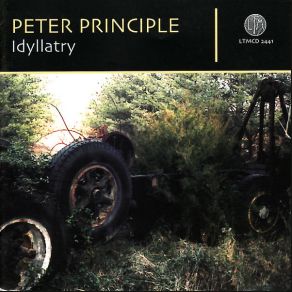Idyllatry
Download links and information about Idyllatry by Peter Principle. This album was released in 2005 and it belongs to Electronica, Alternative genres. It contains 11 tracks with total duration of 01:00:18 minutes.

|
|
|---|---|
| Artist: | Peter Principle |
| Release date: | 2005 |
| Genre: | Electronica, Alternative |
| Tracks: | 11 |
| Duration: | 01:00:18 |
| Buy it NOW at: | |
| Buy on iTunes $9.99 | |
Tracks
[Edit]| No. | Title | Length |
|---|---|---|
| 1. | Emotions | 2:54 |
| 2. | Scissors Cut Paper | 5:55 |
| 3. | Tunguska | 7:33 |
| 4. | The Quarry | 4:10 |
| 5. | The Cloisters | 9:32 |
| 6. | The Unknown | 7:58 |
| 7. | Opening With Distractions | 9:10 |
| 8. | Grandfather Tree | 5:10 |
| 9. | Sculpting Til Dawn | 2:03 |
| 10. | Uncertain | 2:46 |
| 11. | Desolate Idyll Epilogue | 3:07 |
Details
[Edit]This solo effort from one of the Tuxedomoon main men is less a coherent album as such than a compilation of instrumental efforts designed as commissions for installations, a bit like David Sylvian's album Approaching Silence. Mostly it's Peter Principle working on his own, though the lengthy "Tunguska" is a multi-person jam that starts as a fairly tight rock/ramble/funk exercise before stretching out into more ambient corners. Otherwise Principle tackles his own compositions, aside from a playful opening instrumental run through Love's "Emotions," turning it into a bubbly, semi-exotica exercise. It's by no means a hallmark for the collection as a whole — by the time Idyllatry reaches "The Quarry" and "The Cloisters," the intent is to work with meditative, environmental constructions, the former using seagull samples to call to mind a lost, cold beach somewhere, as heightened by the moody music. "The Cloisters," perhaps appropriately, uses a semi-church organ feel as a key element, though the distant tones and melodies that make up most of the piece feel more like a sad broadcast from some unknown shortwave radio source, before a louder section turns the piece into a more aggressive, if still contemplative, composition. "Desolate Idyll" is the longest and concluding piece, a multi-part song that moves between a variety of orchestrations and styles, from minimal keyboard melodies to more bombastic arrangements — more than anything it feels like a soundtrack to an unknown movie, much like the work of In the Nursery. As a whole the album is interesting rather than compelling — the somewhat uninvolving chaos/trudge of "The Unknown" kills the sequencing momentum in particular — but those who enjoy Principle's work already will appreciate it.